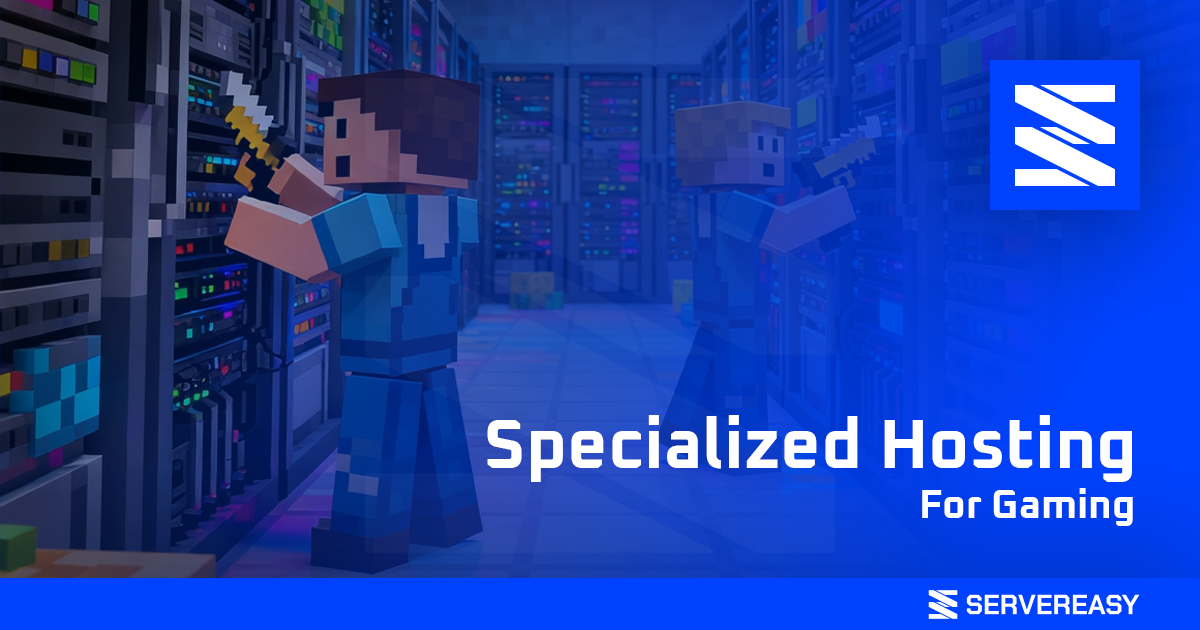
Specialized Hosting for Gaming
In the world of online gaming in 2025, having a dedicated server for online games or specialized gaming hosting makes all the difference. Whether you’re running a Minecraft server with hundreds of players, a multi-gaming platform, or a professional game hosting service, the quality of your gaming hosting can be the difference between a smooth, engaging experience and one that’s frustrating and lag-filled.
With an optimal location, our data center is perfectly suited to host your website or dedicated games, optimally enhancing the gaming experience.
In this complete guide, we’ll explore everything you need to know to choose the ideal dedicated gaming server: from specific hardware requirements for the most popular games, to optimal configurations, and key considerations about security and DDoS protection.
Why a Dedicated Server Is Essential for Game Server Hosting
Specialized Gaming Hosting: Consistent and Predictable Performance
Unlike shared or VPS hosting solutions, a dedicated gaming server offers hardware resources fully dedicated to your project. This results in:
- Reduced latency: Essential for FPS, MOBA, and other competitive games where every millisecond counts
- Stable frame rate: No performance fluctuations caused by other users’ activity
- Efficient peak load management: Ability to handle simultaneous connections during events or promotions
A recent benchmark showed that gaming-optimized dedicated servers can reduce latency by up to 48% compared to shared solutions — a significant competitive advantage for any gaming community.
Full Customization
A dedicated gaming server gives you total control over the environment:
- Freedom to install mods, plugins, and custom software
- Optimized configuration for specific titles or game engines
- Ability to implement advanced anti-cheat systems
- Full management of hardware resources
This flexibility is particularly important for popular game servers such as Minecraft, ARK, or Counter-Strike, which require specific configurations to perform at their best.
Advanced DDoS Protection
DDoS attacks are among the most common threats to game servers. According to recent statistics, over 51% of gaming servers experience at least one significant DDoS attack each month.
Professional gaming hosting includes specialized DDoS protection that:
- Mitigates large-scale volumetric attacks
- Protects against application-layer (Layer 7) attacks
- Keeps your server online even during attack attempts
- Offers real-time threat monitoring
Hardware Requirements for Major Online Games
Minecraft: The Giant of Gaming Servers
Minecraft remains one of the most popular choices for dedicated servers, with hardware requirements that vary significantly depending on the number of players and installed mods:
|
Component
|
Basic Server (1–50 players)
|
Medium Server (50–150 players)
|
Large Server (150+ players)
|
|
CPU
|
4–6 cores, high frequency
|
8 cores, high frequency
|
12+ cores, high frequency
|
|
RAM
|
8–16GB
|
16–32GB
|
32–64GB+
|
|
Storage
|
50GB SSD
|
100GB NVMe
|
200GB+ NVMe
|
|
Network
|
1 Gbps
|
1 Gbps
|
10 Gbps
|
The AMD Ryzen 7600X processor represents an excellent choice for medium-sized Minecraft servers thanks to its high clock speed and great price-to-performance ratio.
ARK: Survival Evolved
ARK is notoriously resource-intensive:
- CPU: Minimum 8 high-frequency cores, ideally 12+ cores
- RAM: 16GB for basic servers, 32GB+ recommended for large maps
- Storage: NVMe SSD required, minimum 100GB
- Network: 1 Gbps connection with low latency
Counter-Strike 2 and Competitive FPS
Competitive FPS games require servers with minimal latency:
- CPU: High clock frequency processors (4.5GHz+)
- RAM: 16GB is sufficient for most servers
- Storage: 50GB SSD/NVMe
- Network: Low-latency connection, ideally with optimized routing
MMOs and Custom Game Servers
For MMOs and custom game servers, configurations vary widely, but generally require:
- CPU: 8+ cores with a good balance between frequency and core count
- RAM: 32–64GB to handle databases and persistent worlds
- Storage: RAID configuration with NVMe for databases and game files
- Network: 10 Gbps connectivity to support thousands of simultaneous connections
AMD Ryzen: The Ideal Choice for Gaming Servers
The AMD Ryzen 7000 series processors are currently the optimal choice for gaming servers thanks to:
Ryzen 7600X: Affordable Power ON SALE
The dedicated gaming server Ryzen 7600X offers:
- 6 cores / 12 threads with boost clock up to 5.3GHz
- Zen 4 architecture with improved IPC (Instructions Per Cycle)
- DDR5 support for greater memory bandwidth
- Excellent price/performance ratio for small and medium gaming servers
This CPU is ideal for Minecraft, Counter-Strike 2, and other games that benefit from high frequencies.
Ryzen 7950X: Uncompromised Performance
For more ambitious gaming projects, the Ryzen 7950X offers:
- 16 cores / 32 threads with boost clock up to 5.7GHz
- Outstanding multi-thread performance to handle hundreds of players
- Expanded L3 cache to reduce latency
- Advanced virtualization capabilities for multi-server hosting
- This CPU is ideal for:
- Multi-gaming servers hosting several games simultaneously
- MMO platforms with hundreds of connected players
- Professional game hosting services with high performance requirements
Server Optimization for Superior Gaming Performance
Operating System Configuration
The choice and configuration of the operating system are crucial:
- Linux vs Windows: Linux generally delivers better performance for most gaming servers, with less overhead and greater stability
- Optimized kernel: Custom kernels like Liquorix or Xanmod can significantly improve gaming performance
- Network configuration: Optimizing TCP/IP parameters to reduce latency and improve connection handling
Memory Optimization
Efficient RAM management can make a big difference:
- Swap configuration to prevent crashes during usage peaks
- Optimized JVM parameters for Minecraft servers (garbage collection, heap size)
- Use of ECC RAM to prevent data corruption
Protection and Security for Gaming Servers
Defense Against DDoS Attacks
DDoS protection is essential for any gaming server:
- Volumetric protection: To mitigate large-scale attacks
- Intelligent filters: To distinguish legitimate from malicious traffic
- Layer 7 protection: To defend against application-level attacks
Servereasy offers proprietary DDoS protection specifically developed for online gaming needs, with mitigation capacity up to 1.2 Tbps.
Management and Monitoring with 24/7 Support
Real-time monitoring is crucial for:
- Identifying performance issues before they affect players
- Monitoring resource usage and planning upgrades
- Detecting suspicious activity or attack attempts
- Analyzing usage trends to optimize the experience
Servereasy provides dedicated servers specifically configured for gaming needs, featuring next-generation hardware such as AMD Ryzen 7600X and 7950X processors, proprietary DDoS protection, and specialized technical support.
ServerEasy Answers:
Why is a dedicated server better than a VPS for gaming?
A dedicated gaming server offers significantly better performance than a VPS thanks to exclusive access to all hardware resources. This results in reduced latency (up to 48% less), more stable frame rates, and the ability to handle connection spikes during events. Dedicated servers also allow full customization of the operating system and hardware — essential for optimizing demanding games like ARK or Minecraft servers with multiple mods.
How much RAM is needed for a Minecraft server with 100 players?
For a Minecraft server with 100 simultaneous players, it’s recommended to have at least 16–32 GB of RAM. The exact requirement depends on factors such as mods, plugins, and gameplay style: Vanilla Minecraft can run on 16 GB, but heavy modpacks or Spigot/Paper setups may require 24–32 GB. Proper JVM tuning (matching -Xmx and -Xms) ensures optimal performance and prevents lag during peak activity.
Which processor is better for a gaming server: AMD Ryzen or Intel Xeon?
For most gaming servers, AMD Ryzen CPUs (e.g., 7600X or 7950X) provide the best price-to-performance ratio thanks to high clock speeds (up to 5.7 GHz) and strong single-core performance. Games benefit from high frequencies, making Ryzen ideal. Intel Xeon CPUs are designed for enterprise environments that prioritize ECC memory support and stability but often deliver lower gaming performance at comparable prices.
How can I protect my gaming server from DDoS attacks?
To effectively protect your gaming server from DDoS attacks, use specialized DDoS protection such as Servereasy’s, featuring volumetric mitigation for large-scale attacks, intelligent traffic filtering, and Layer 7 protection for application-level defense. You should also hide the real IP behind a proxy, configure firewalls for game protocols, and keep all software up to date to patch known vulnerabilities.
Linux or Windows for a dedicated gaming server?
Linux is generally the better choice for gaming servers due to lower system overhead, greater stability, enhanced security, and no licensing costs. Distributions like Ubuntu Server or Debian are ideal for Minecraft, ARK, and similar games. Windows is only required for titles that depend on specific Microsoft technologies like .NET. Linux offers more flexibility for optimization and configuration.
How important is network speed for a gaming server?
Network performance is critical for gaming servers. Beyond raw bandwidth (1 Gbps is typically sufficient), low latency, stable connections, and zero packet loss matter most. Optimized routing can reduce latency by up to 30%. For servers hosting 100+ concurrent players or heavy data streams, a 10 Gbps connection is recommended. The physical location of the datacenter relative to players also affects gameplay quality.
How can I optimize a Minecraft server to reduce lag?
To optimize a Minecraft server and minimize lag:
1) Use Paper or Purpur instead of Vanilla;
2) Set -Xms and -Xmx to equal values and enable G1GC;
3) Limit render distance and pre-generated chunks;
4) Use plugins like Clearlag;
5) Optimize view-distance and simulation-distance;
6) Use NVMe SSD storage;
7) Pre-generate chunks;
8) Monitor and control redstone clocks and complex farms.
These adjustments can greatly improve performance and player experience.
What are the hidden costs of a dedicated gaming server?
Beyond the base server cost, consider potential hidden expenses such as:
1) Extra bandwidth beyond plan limits;
2) Software licenses (OS, control panels);
3) Backup storage and retention;
4) Advanced DDoS protection (included by default with Servereasy);
5) Additional IP addresses;
6) Premium technical support;
7) Migration fees when changing providers;
8) Hardware upgrades for expanding communities.
Always evaluate the full Total Cost of Ownership (TCO) before choosing a hosting provider.

